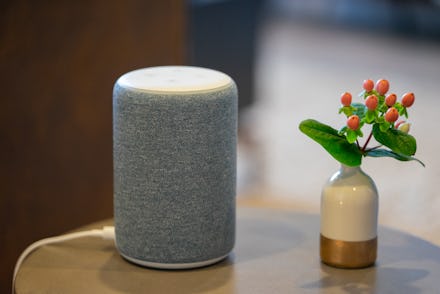“Alexa, help me”: A coronavirus patient begged her smart speaker for help dozens of times before she died

LouAnn Dagen, a 66-year-old woman living in a nursing home in Ceder Springs, Michigan, recently passed away due to complications that occurred after she contracted coronavirus. According to a report from local NBC affiliate WOOD-TV, some of Dagen's final conversations were with Alexa. She had an Amazon Echo Show in her room and reached out to the voice assistant multiple times to provide help as she struggled to manage the pain from the disease.
After Dagen's passing, her older sister Penny accessed some of the stored recordings of interactions that LouAnn had with Alexa. According to WOOD-TV, she had about 40 conversations over the course of the final three or four days of her life. At one point, she prompted the voice assistant by saying "Alexa, help me." She then told Alexa, "I am in pain. I have to find a way to relieve it," and asked, "Can you help me cope with pain?" Dagen even tried to reach out to law enforcement, asking Alexa, “How do I get to the police?” The device provided her with directions to nearby police stations.
Amazon recently equipped Alexa with some additional skills to handle coronavirus-related prompts. The voice assistant uses information provided by guidance from the Centers for Disease Control and Prevention to answer questions like, "What should I do if I think I have coronavirus?" The voice-activated AI is trained to prompt users with questions about their travel history, symptoms, and any possible exposure. Apple recently outfitted Siri with similar capabilities to help guide people through concerns that they might be infected. However, no smart speaker is equipped to handle the types of questions that Dagen presented, as she expressed repeatedly the need for care and pain relief. Even her prompt asking for law enforcement would not yield much help, as Alexa cannot call emergency services on its own without third-party skills installed.
A spokesperson for Amazon told Mic, “We were saddened to hear about this news, and our hearts go out to the family. Today, customers can ask Alexa to call family or friends, or set up skills like Ask My Buddy, which lets you alert someone in your Personal Alert Network that you need them to check on you. We continue to build more features to help our customers.” The spokesperson noted that Alexa calling is not a replacement for life safety services and cannot directly contact emergency services.
The harrowing conversations that Dagen had with Alexa speak to how serious coronavirus is, particularly in patients with preexisting conditions that put them at risk. According to a report from NBC News, Dagen had previously suffered two strokes that paralyzed the left side of her body. She also dealt with diabetes and hypertension — two underlying conditions that have been identified as risk factors for severe cases of coronavirus. According to an account provided by her sister to WOOD-TV, LouAnn Dagen experienced shortness of breath early last week, but did not have an elevated temperature so she was kept in the nursing home facility rather than being transferred to a hospital. Her symptoms progressed and on Thursday, caregivers had to provide her with a saline solution because she was getting dehydrated but wouldn't drink anything. By Saturday, her oxygen level and blood pressure dropped so severely that she was sent to the emergency room at Mercy Health Saint Mary’s in Grand Rapids, Michigan. She started experiencing convulsions at the hospital and was put on a respirator. Within a half-hour, she had died.
It was during those few days between her receiving the saline solution and being transferred to the hospital that Dagen expressed problems with pain to her Amazon Echo Show. In a statement to Mic, Paul Pruitt, director of operations at Metron nursing homes, says that Dagen was receiving "excellent care" and the staff followed "both her advanced directives and clinical practice guidelines to manage her pain and symptoms." He said that once her symptoms progressed rapidly she was sent to the hospital "at the advice of her medical team." Pruitt explains that Alexa was Dagen's "primary communication tool with her sister," particularly when Penny was unable to ge to the facility. "She could call her sister through the device and they communicated often. It was a very positive part of her life which we supported fully,” he says.
The nursing home where Dagen resided has been dealing with a significant coronavirus outbreak. The facility, which has 77 beds in total, has seen 31 residents and five employees test positive for the virus. The facility reports isolating residents who have tested positive, but the spread has been wide-reaching. The virus tends to spread quickly in these contained facilities where many of the residents have risk factors that could result in serious complications from contracting coronavirus. One of the earliest known outbreaks of COVID-19 in the United States occurred in the Life Care Center nursing home in Kirkland, Washington, where 81 residents tested positive for the virus and 35 died from it.